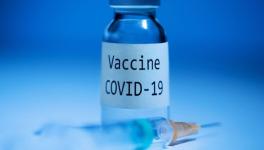Debate Rages in UK Over 12-Week Gap Between COVID-19 Vaccine Doses
London: Senior medics are at odds in the UK over the optimum gap between the two doses of vaccines being administered for protection against COVID-19.
The two vaccines currently being injected among the country's priority groups, Pfizer/BioNTech and Oxford/AstraZeneca, both require a booster shot a few weeks later.
Initial advice for the second dose to be delivered within 21 days was modified by the UK government scientists to up to 12 weeks apart, with the aim of vaccinating larger numbers with at least one jab to inject some level of immediate protection.
The government's Joint Committee on Vaccination and Immunisation (JCVI) claims unpublished data suggest that the Oxford-AstraZeneca vaccine is still effective with doses 12 weeks apart.
But American pharma major Pfizer has said it has tested its vaccine's efficacy only when the two doses were given up to 21 days apart, creating some doubt over its efficacy with a larger time gap.
The World Health Organization (WHO) recommends a gap of four weeks between doses, to be extended only in exceptional circumstances to six weeks.
Speaking alongside UK Prime Minister Boris Johnson at a 10 Downing Street briefing in London on Friday, England’s Chief Medical Officer (CMO) Professor Chris Whitty reiterated that increasing the gap between doses to a maximum of 12 weeks would allow "many more people to be vaccinated much more quickly".
In a letter to Prof. Whitty, the British Medical Association (BMA) has said it agreed that the vaccine should be rolled out "as quickly as possible" – but called for an urgent review and for the gap to be reduced.
Dr Chaand Nagpaul, chair of the BMA Council, told the BBC there were "growing concerns" that the vaccine could become less effective with doses 12 weeks apart.
"Obviously the protection will not vanish after six weeks, but what we do not know is what level of protection will be offered [after that point]. We should not be extrapolating data when we don't have it," he said.
The debate is playing out as Johnson confirmed 5.4 million people across the UK have now received their first dose of the vaccine against COVID-19, with a record 400,000 vaccinations between Thursday and Friday.
“In England one in 10 of all adults have received their first dose, including 71 per cent of over-80s and two thirds of elderly care home residents… There is much more to do, and the target remains very stretching indeed, but we remain on track to reach our goal of offering a first dose to everyone in the top four priority groups by the middle of February,” said Johnson.
It came as he also admitted that early data reflect that the new variant of coronavirus detected in southern England at the end of last year is likely to also be deadlier in addition to being highly transmissible, as the UK registered another 1,401 deaths in its daily coronavirus tally.
“It is largely the impact of this new variant that means the NHS is under such intense pressure… So, it is more important than ever that we all remain vigilant in following the rules and that we stay at home, protect the NHS and thereby save lives,” he said.
He added that all current evidence continues to show that the vaccines being used remain effective against both the old and new variant.
Get the latest reports & analysis with people's perspective on Protests, movements & deep analytical videos, discussions of the current affairs in your Telegram app. Subscribe to NewsClick's Telegram channel & get Real-Time updates on stories, as they get published on our website.























